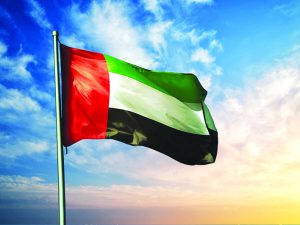DUBAI / WAM
Omar bin Sultan Al Olama, Minister of State for Artificial Intelligence, Digital Economy, and Remote Work Applications, affirmed that the UAE government adopts a proactive approach based on designing visions and goals, as well as developing and implementing initiatives and projects that lay the foundations of a pioneering digital economy. This economy combines national skills and technological solutions, forming an advanced model that contributes to achieving the targets of the national strategy for the digital economy, by multiplying the contribution of the digital economy to non-oil GDP over the next decade. He stated that the UAE government is intensifying efforts to accelerate the adoption of digital solutions, aiming through its initiatives and projects to envision and shape the digital future, enhancing the UAE’s leadership and global competitiveness in various fields. This came during Al Olama’s chairing of the meeting of the UAE Council for Digital Economy held at the Securities and Commodities Authority in Dubai. The council reviewed the updates regarding several strategic initiatives aimed at supporting and accelerating the implementation of the UAE’s strategic objectives for the digital economy, in areas such as infrastructure, digital transactions, e-commerce, financial technologies, stimulating investment in digital sectors, attracting and developing digital skills, supporting SMEs and the latest developments in digital economy statistics gathering and the annual report on measuring the digital economy, prepared in cooperation with the Federal Competitiveness and Statistics Centre.
The council reviewed as well the developments in digital infrastructure development in the country, and the level of adoption of technological solutions, which have significantly increased in recent months. The adoption of the use of digital signatures increased by 216 percent in 2023, while blockchain was used as well, involving 9 banks, 6 exchange houses, and 3 insurance companies.
The council further reviewed digital services in the federal network, which were launched to include voice-to-text and text-to-voice conversion, translation, analysis of different emotions, extraction of key phrases, language analysis, and services suitable for accessing high-performance computing resources for machine learning, deep learning, and other applications.
The council discussed topics such as the government service level policy, data centre distribution and cloud computing deployment in Gulf countries, cloud computing companies in the UAE, as well as the latest Internet network indicators and the performance and coverage of the fifth-generation network in the country.
In addition, the adoption rate of the sixth version of the Internet Protocol reached 50.7 percent in January 2024, and the level of mobile network coverage continued to achieve 100 percent coverage, ranking the first position in the Middle East in Internet exchange traffic and the first position globally in fifth-generation network speeds in 2023. The UAE Council for Digital Economy is responsible for implementing the digital economy agenda, achieving its strategic indicators, shaping the future of the digital economy, and its strategic directions in the UAE.
 The Gulf Time Newspaper One of the finest business newspapers in the UAE brought to you by our professional writers and editors.
The Gulf Time Newspaper One of the finest business newspapers in the UAE brought to you by our professional writers and editors.
